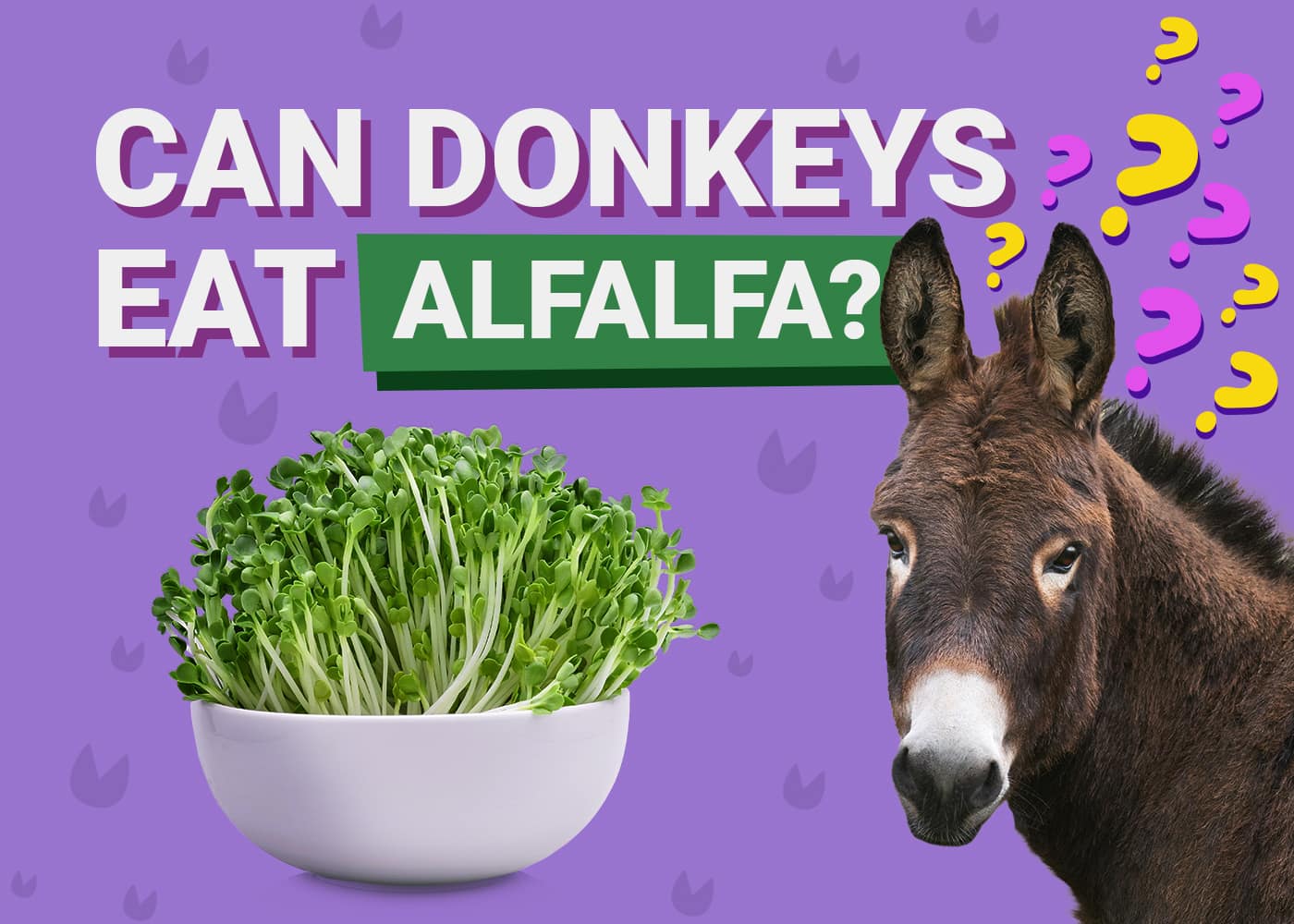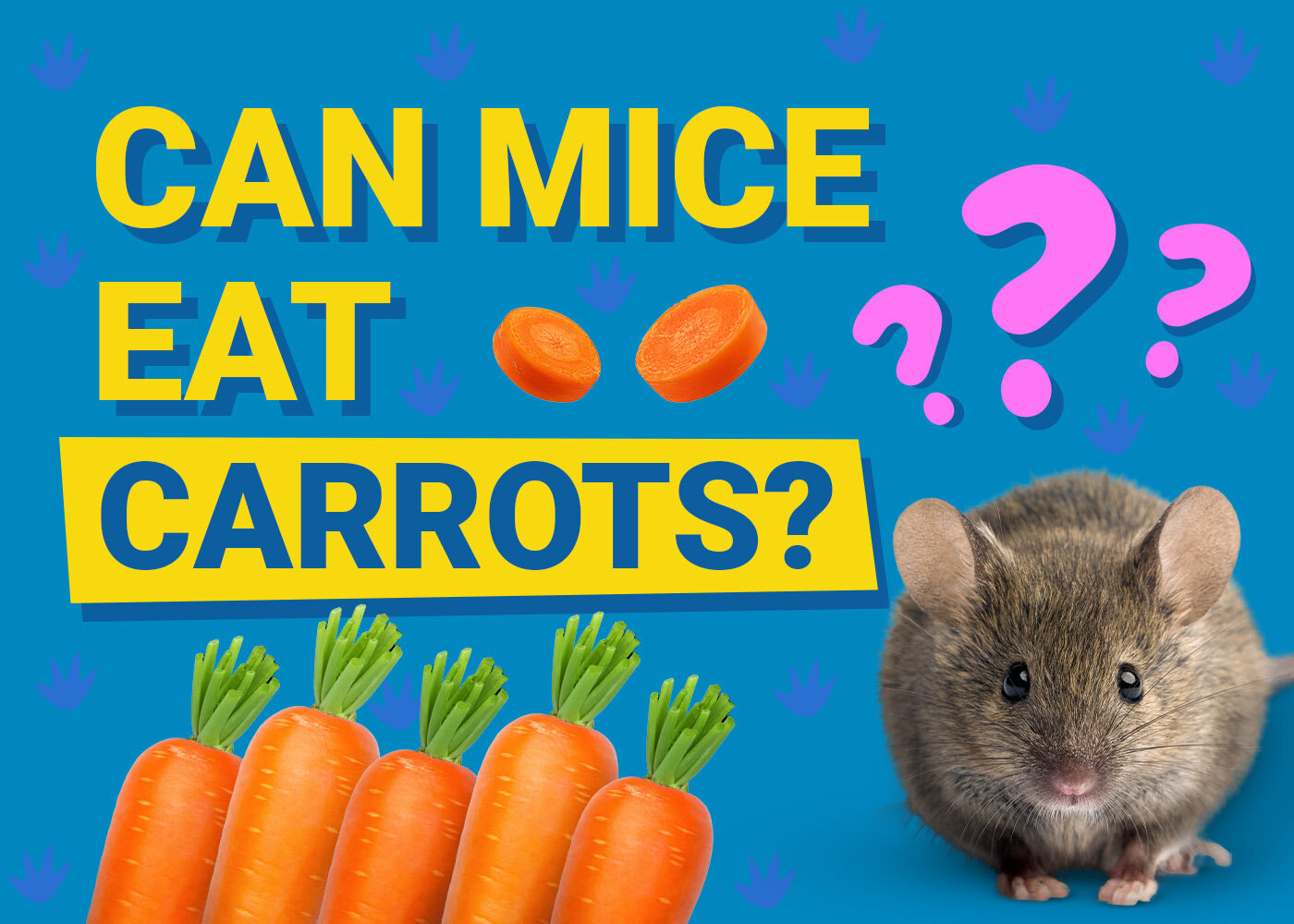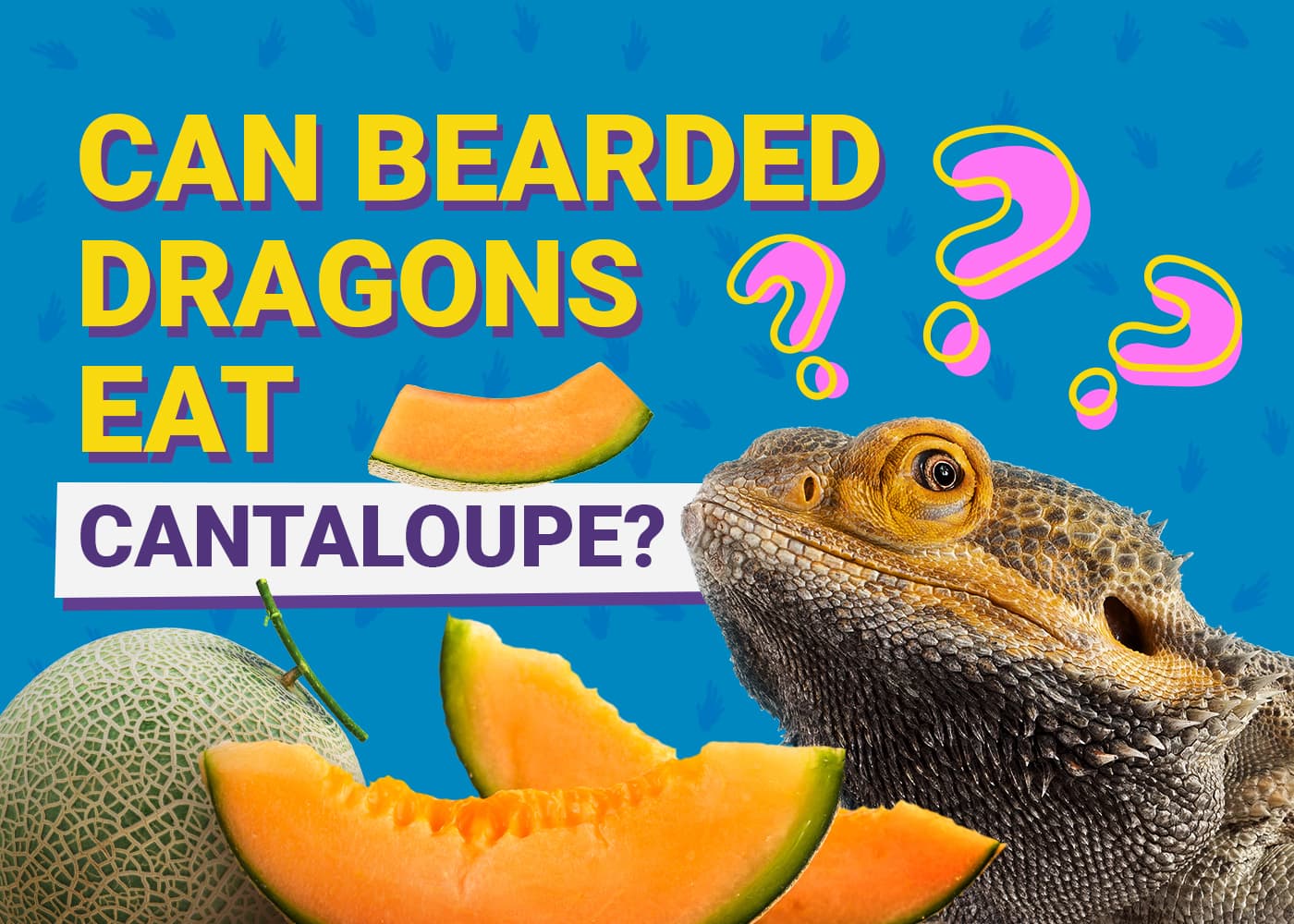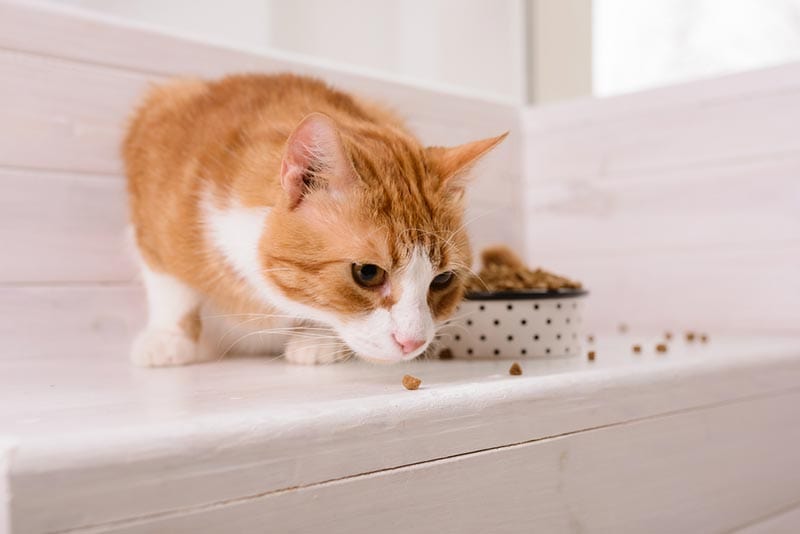Click to Skip Ahead
Among many other noteworthy traits, donkeys are renowned for their incredible hardiness. They are capable of surviving in harsh conditions that often offer little in the way of palatable nutrition. This makes it very easy for them to feed in a farmyard environment that routinely has more than enough lush fodder on hand.
Alfalfa is a fodder commonly found growing in fields and is available in most farms’ feed stores. It is nutritious feed for many farm animals, including horses, cattle, sheep, chickens, and turkeys. It would be reasonable to conclude that it would be good for donkeys, but it may surprise you to learn that donkeys should not be fed alfalfa.

What is Alfalfa?
Alfalfa (Medicago sativa) is a perennial flowering plant belonging to the legume family, known in other countries as lucerne. It is a highly valued animal feed used for grazing, hay, silage, and producing pellet food. It is high in vital vitamins and minerals, such as Vitamins K, C, B, iron, magnesium, and copper.¹
Alfalfa also has a significantly high crude protein content, making it an excellent choice for most farm animals. Yet, for the same reason, it is bad for donkeys.
We realize this may seem puzzling! Read on for the interesting explanation.
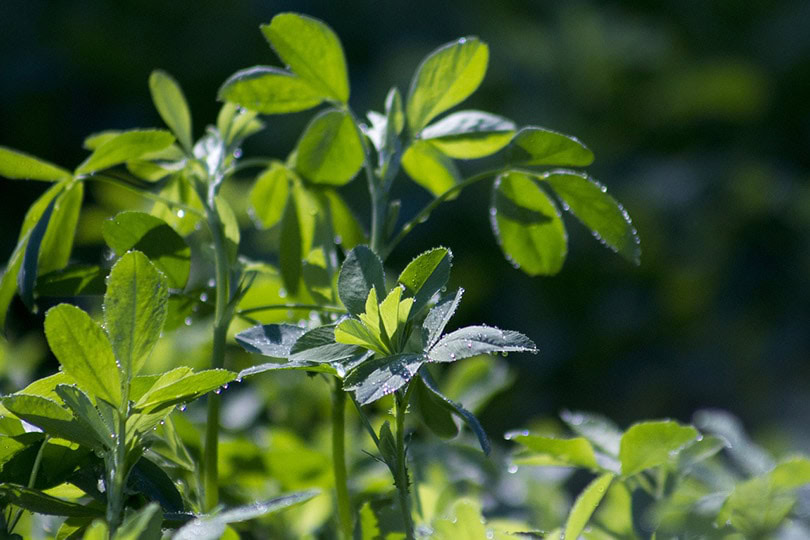
Donkeys Versus Horses
Donkeys and horses are closely related, both belonging to the genus Equus. However, thanks to evolutionary divergence, the two have become distinct breeds.2 They continue to share some similarities, but they exhibit clear differences—one of which is their nutritional requirements.
Donkeys evolved in the hot and arid environments of Asia and Africa. The regions are characterized by sparse vegetation, which results in poor grazing and browsing. They adapted efficiently to survive in these conditions, living off of plants high in fiber and relatively low in nutrients. Another amazing adaptation they possess is the ability to recycle nitrogen (the building block of proteins) in their bodies, in contrast to horses that excrete excess nitrogen as urea.
Why Can’t Donkeys Eat Alfafa?
Although alfalfa is not toxic to donkeys, its nitrogen content is much too high for them. Since they cannot excrete excess nitrogen, feeding alfalfa can be harmful. The two most common consequences of feeding donkeys alfalfa are obesity and laminitis. Donkeys kept as pets are predisposed to obesity because of their efficient nutritional physiology. So, it doesn’t take much to bring about such conditions.
Obesity in donkeys can result in hyperlipemia and laminitis, as well as place the organs under strain.3,4 Laminitis is an excruciatingly painful disease that causes soft tissue inflammation in the hoof. It is challenging to treat and frequently fatal. Hyperlipemia is a disease that affects the organs and, sadly, also often results in death.
Therefore, alfalfa should not be served to donkeys, whether it is from grazing, hay, silage, or pellets.
What Else Should Donkeys Not Eat?
In addition to alfalfa, there are several other foods to avoid when feeding donkeys. For example, donkeys should not be served feeds formulated for other animals, even horse feed, as the nutrient value makes them unsuitable. Additionally, some commercial animal feeds are treated with species-targeted medication that could make them dangerous, or even fatal, to donkeys if ingested.
Donkeys should not be allowed access to pastures or given plants treated with herbicides, pesticides, or rodenticides. Some of these poisons can be toxic to donkeys, and ingestion could result in organ damage or even death.
It is also best to avoid feeding them sugary treats such as biscuits, bread, chocolate, and cereal grains such as oats and barley, as the sugar and starch content is too high. Vegetables like broccoli, onions, garlic, tomatoes, cauliflower, aubergine, and potatoes should also be avoided, as well as stone fruits, which can pose a choking hazard.
There are several naturally occurring plants and shrubs to be aware of.
- Oak trees
- Black Walnut trees
- Red Maple trees
- Japanese Yew
- Oleander
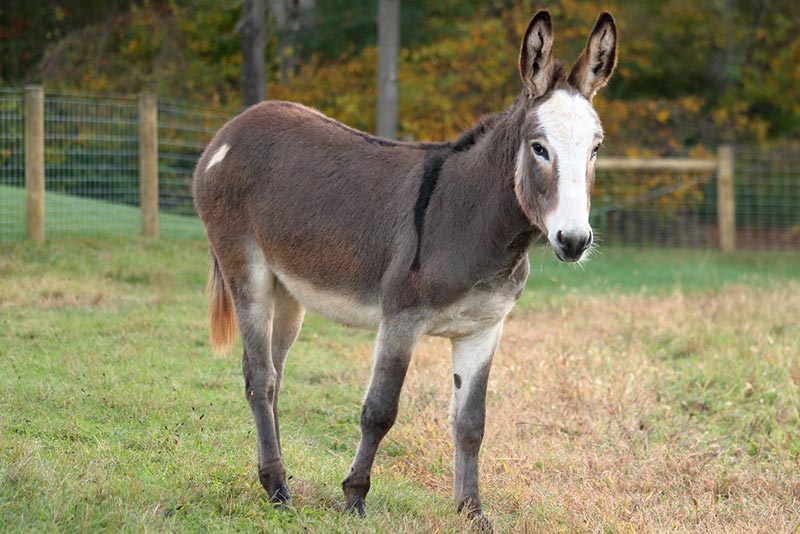
What Should Donkeys Eat?
The good news is that donkeys thrive on low-grade fodder that is not beneficial to many other farm animals and might otherwise go to waste. In this way, they are low-cost farmyard companions that will not compete with other livestock for the best grazing and fodder.
Donkeys do well on high-fiber fodder, such as straw. Barley straw, in particular, is a good choice for donkeys, as it is low in sugar and closest to the grazing plants they have in their natural habitat. It is vital to ensure that their straw is fresh, dry, and dust and mold-free.
In winter, it is acceptable to supplement their diet with hay and other forage that is higher in sugar and starch, as their metabolism speeds up to keep them warm, and they will utilize the additional nutrients. However, barley straw should comprise at least 50% of their diet.
The grazing of pastures can be allowed but must be carefully controlled. It should only form a supplementary component of their feed rather than the primary source. Of course, it’s impossible not to offer the occasional treat to your donkey. Donkeys love to snack on fruits and vegetables like apples, carrots, swedes, pears, turnips, and bananas.
Remember, they should always have clean, fresh water available 24 hours a day.
How Often Should Donkeys Be Fed?
Donkeys should always have access to barley hay. If they are going to be offered pasture, it should only be for part of the day, after which they should be returned to a paddock or enclosure where they can return to consuming straw.
If their straw is supplemented with grass or hay, it can be fed two to three times a day.
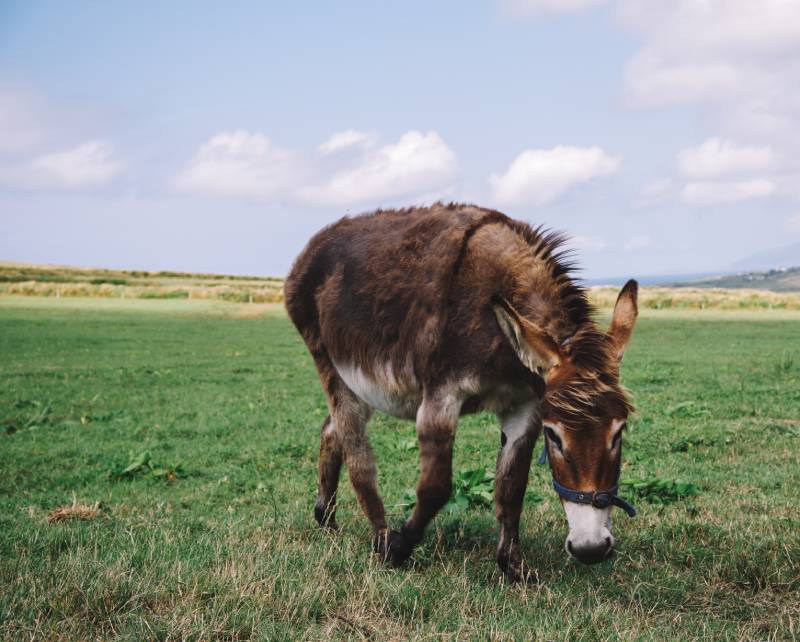

Conclusion
Donkeys are the most efficient of the equines in terms of their nutritional needs, and they are an incredible complementary species to have in the farmyard. The bulk of their diet should comprise a high-fiber offering, such as barley straw, to ensure their health, happiness, and longevity. Although alfalfa is not toxic to donkeys and can even be acceptable in tiny amounts, it is best avoided entirely to minimize the risks.
Featured Image Credit: Orest lyzhechka, Shutterstock
